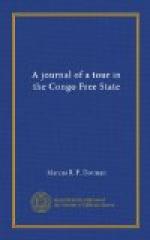On September 22nd we reach the Kuangu river where is situated the chief post of a French Trading Company. The buildings are as usual of bricks, the mortar being made of the shells of river oysters and sand. Soon after our arrival, a poor native was brought in whose hand had been terribly mangled in a circular saw. We dressed it as carefully as possible and fixed it on a splint until he could reach a post with a hospital. In the night however, weird chanting was heard and next day we discovered that his friends had been exorcising the evil spirits—i.e. the perchloride of mercury in which the hand had been washed—had torn off all the bandages and sent the boy a way in a canoe to avoid the white medicine man. The hand will almost certainly fall off and the further history of the boy will perhaps be interesting. One of the traders, Mr. Constantine, a Swiss, said he had been stationed in the interior and had heard no news since January. We are only able to bring him up to June, three months behind date. This gentleman has had an interesting career. He fought for England in the Matabele war and then settled in the Orange Free State where he was commandeered by Cronje and forced into the trenches at Magersfontein, but to his own great satisfaction was soon taken prisoner by the British and was very well treated. He now lives absolutely alone, without a guard of any sort, some days’ journey from the river and feels quite safe, for the natives here look upon a white man as a protection from the Arabs. This Company trades in rubber with the natives, paying in beads at the rate of 40 centimes a kilogramme. It is therefore, unlikely that many natives migrate to the French Congo where they receive no more pay for their work than in the State, and are besides taxed. The country behind the station is flat veldt and only a few small elephants are occasionally found. The usual heavy tornado bursts in the afternoon nearly filling the launch and boat with water in a very short time. Having bought some wine and other stores, from the Company we next day continue up the river past many villages all densely populated. The architecture has again changed, the huts now being tent shaped and rising to a point in the centre which is sometimes ornamented with a pair of antelope horns. Some of the villages have plantations and all the inhabitants seem desirous to trade, salt being the substance usually demanded in return for lances, knives or curios. Indeed, even our own people wish to do a little business, and after buying articles from the villagers, try to sell them to us at no doubt a greatly enhanced price. The higher one travels up the river, the more numerous and densely populated are the villages until they extend almost without a break for many miles along the banks. Each one supplies us with a bras of wood which is paid for with beads. The scenery here in the very centre of Africa is beautiful, range after range of hills, not however very high, extending




